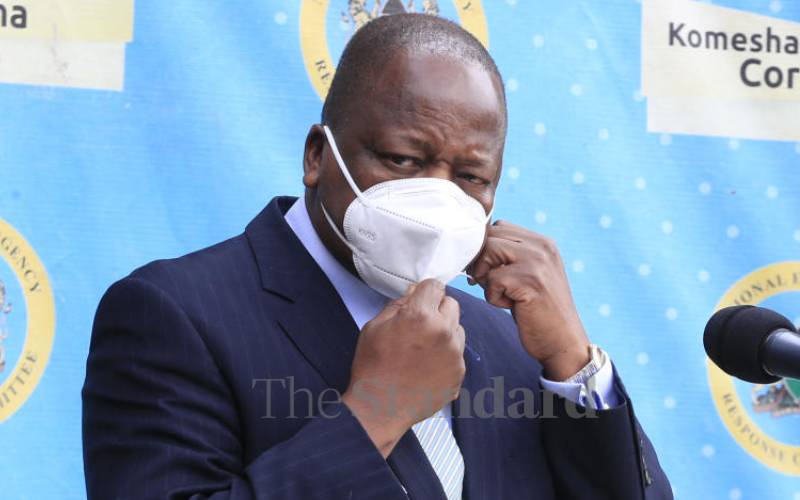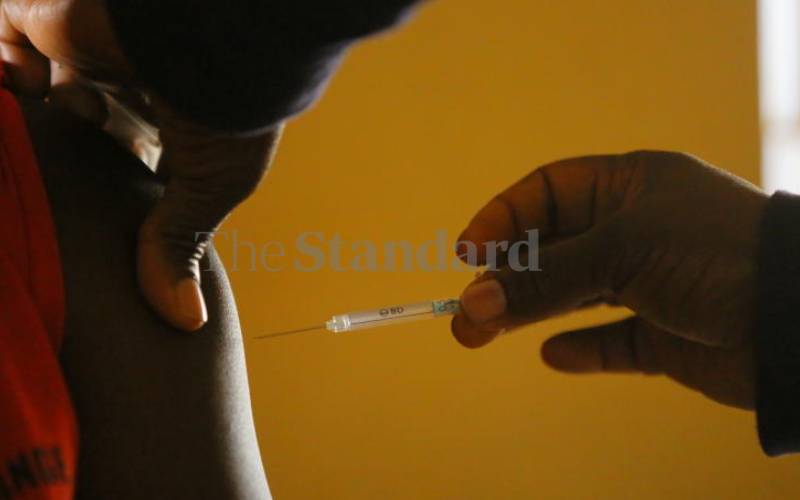
Health CS Mutahi Kagwe, Afya House. August 5, 2021. [Stafford Ondego, Standard]
The country is witnessing the fifth wave of the coronavirus pandemic, Kenyan scientists have warned.
Data by the Ministry of Health reveals a rise in infections in the past two weeks and experts have attributed surging cases to the more transmissible Omicron variant, failure to adhere to public health containment measures and the Delta variant that is still dominant.
Matilu Mwau, Deputy Director at Kenya Medical Research Institute (Kemri), said although Delta is still the most dominant variant, Omicron is more infectious and with time, it might be more widespread.
“The numbers have begun to rise and are rising steadily and convincingly. This translates to a fifth wave,” said Prof Mwau.
More than 7,000 positive cases have been reported in the country from December 4 to December 18, out of a sample size of 75,318.
Mwau said it is not clear on how long the fifth wave might last.
“I do not know how big the wave may be, I have mixed feelings about the wave, because there are so many front-line people who are vaccinated, but at the same time, Omicron is very infectious,” he said.
The researcher said those who are vaccinated are protected from serious illnesses and deaths, even from Omicron.
Even for Delta, he said those who were not vaccinated suffered and died more as compared to the vaccinated.
“People have to be extra vigilant during this holiday season. Those who have not been vaccinated should get the jab to keep themselves out of hospitals and prevent deaths. This is a chance to save lives,” said Mwau.
Kenya reported its first wave in August 2020, with an average of 700 cases and 14 deaths a day.
Three months later, the second wave was reported with an average of 21 deaths per day.
The third wave was reported in March this year when about 21 deaths were recorded per day.
A fourth wave was documented on July 1.

More than 7,000 positive cases have been reported in the country from December 4 to December 18. [Sammy Omingo, Standard]
Studies by Kemri Wellcome Trust published in July this year predicted that Delta variant could cause more deaths and hospitalisation.
Delta was documented to be 60 per cent more dominant than the Alpha variant. Deaths and hospitalisations linked to the Delta variant were predicted to be higher by the end of this year.
Other variants of the virus so far reported in the country are Alpha and Beta.
In an earlier interview, Acting Director-General in the Ministry of Health, Patrick Amoth, said the country could escape future waves of the disease if Kenyans observed the health protocols in place.
“Adhering to such measures can break the potential of a wave to develop,” Dr Amoth said. “We might have several waves in future because of mutation of the virus and new variants. This is part of evolution in biology of viruses.”
Mwau said the festive season may also contribute to a surge in infections due to massive travels and events that come with the season.
“People are already converging and travelling, an issue that might spread the virus more,” he said. “The memory of Kenyans and the society is challenged. We have quickly forgotten how to prevent infections. That forgetfulness is the one that will see the number of infections rise.”
Prof Mwau was, however, reluctant on whether it is time to roll out booster vaccines.
“Whereas science reveals that booster vaccines help boost immunity, the scientific finding should be put into policy to be relevant to Kenyans. At the moment, it has not been put, and it is not relevant for us to advise Kenyans to pick it,” he said, adding, “If we vaccinate all people, we could arrest the natural cause of the coronavirus, irrespective of variants that might come along the way.”
Kenya launched its vaccination drive on March 5, and has received about 23 million doses of various vaccines.
 The Standard Group Plc is a multi-media organization with investments in media
platforms spanning newspaper print
operations, television, radio broadcasting, digital and online services. The
Standard Group is recognized as a
leading multi-media house in Kenya with a key influence in matters of national
and international interest.
The Standard Group Plc is a multi-media organization with investments in media
platforms spanning newspaper print
operations, television, radio broadcasting, digital and online services. The
Standard Group is recognized as a
leading multi-media house in Kenya with a key influence in matters of national
and international interest.











